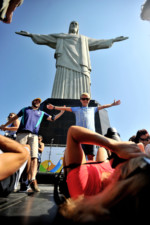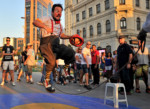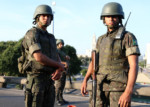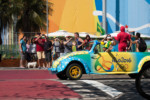words KARA BERG | BSU AT THE GAMES
Olympic spirit overtakes the Olympic city
As the Olympic Games begin and the preparation stage ends in Rio de Janeiro, residents are beginning to get in the spirit for the Games.
Daniel Maltarollo, from Rio de Janeiro, said people are starting to focus less on the difficulties the city had preparing and are looking forward to it now.
But the Games still aren’t Maltarollo’s main priority. He’s most excited to be able to share his country’s culture with the half a million tourists who are expected to flock to Rio.
“There’s so many people running about the city, and it’s a joy to be able to share it with them,” Maltarollo said. “I’m not as much excited for the Games myself, but I’m certainly looking forward to the legacy for the country.”
Harry Varnadore and Gary Delaune, both from New Orleans, Louisiana, are two of the many who came to Rio to experience the Olympic Games. Decked in their Team USA gear, they were exploring Copacabana Beach after the Olympic torch passed by.
They visited Rio last year and loved it, and said they were having a good time here so far.
“Everything you hear about Rio at home, all the horrible things, none of it is true,” Delaune said.
The security is better than he thought it would be, Delaune said. He knew he would be in good hands when he saw about 100 military police standing around the torch.
The crowds of military police atmosphere around the torch at Copacabana Beach the morning before the Opening Ceremony showed that Rio really was cracking down on security.
Instead of the free-for-all selfie-fest that the torch relay was in parts of Sao Paulo, the biggest city in Brazil, the relay at Copacabana was more controlled.
Armed guards linked arms and had their hands on their guns, ready to act if anything were to happen. The yelling and dancing crowds were still the same, but the presence of guns make the chaos much more controlled.
This increased police presence is just one of the legacies residents hope will continue after the Olympic Games end.
Bruno Paiva, 36, said as the Games have drawn closer, the atmosphere of the city has changed.
The added new venues and increased public transportation have made a big impact on the city, even though he thinks the money should have gone to fix health and security problems.
“It’s very nice to see, but it’s not the true Rio,” Paiva said.




Kara Berg is a Ball State University student and writer for BSU at the Games, a group of 50 journalism students traveling from Muncie, Indiana to Rio for the Olympic Games. Follow them at bsuatthegames.com, @bsuatthegames on Twitter and Instagram, and BSU at the Games on Facebook.










